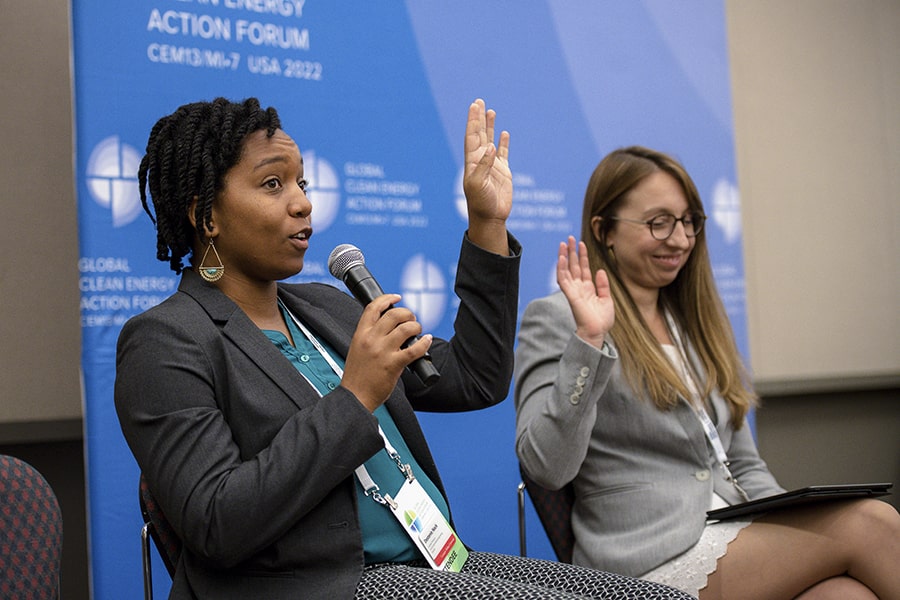EPP Faculty and PhD students take part in the Global Clean Energy Action Forum
There was notable excitement around the opening of the Global Clean Energy Action Forum (GCEAF) Wednesday evening, Sept. 21. The three-day event drew members of the global energy community to Pittsburgh to share their ideas on how to move toward a clean and sustainable future. Carnegie Mellon University was a co-sponsor with the Department of Energy (DOE) in hosting GCEAF.
This first-ever event featured a high-level plenary, topical roundtables with energy and science ministers from 31 countries, CEOs and experts, expert panel discussions, technology demonstrations and pitches, and other activities, all focused on how to deploy clean energy technologies.
 From left, CMU's Associate Professor Valerie Karplus and Professor Paulina Jaramillo; U.S. Secretary of Energy Jennifer Granholm; and CMU President Farnam Jahanian during the opening reception for the Global Clean Energy Action Forum on Wednesday Sept. 21, 2022, at the Senator John Heinz History Museum.
From left, CMU's Associate Professor Valerie Karplus and Professor Paulina Jaramillo; U.S. Secretary of Energy Jennifer Granholm; and CMU President Farnam Jahanian during the opening reception for the Global Clean Energy Action Forum on Wednesday Sept. 21, 2022, at the Senator John Heinz History Museum.
Several CMU faculty members, alumni, students and administrators took part in panels during both days of GCEAF.
CMU Professor of Engineering and Public Policy (EPP) and Co-Director of the Green Design Institute Paulina Jaramillo led a panel discussion on the recently launched Open Energy Outlook (OEO), an initiative that aims to examine U.S. energy futures to inform energy and climate policy efforts by applying the gold standards of policy-focused academic modeling, maximizing transparency and building a networked community. Katie Jordan, a Ph.D. student in EPP, presented the team's methodology and findings. The OEO is an initiative of the Wilton E. Scott Institute for Energy Innovation at CMU in partnership with North Carolina State University and funding from the Sloan Foundation.
Valerie Karplus, associate professor in EPP, took part in a session entitled "A High Road Energy Transition: Ensuring Fairness for U.S. Workers and Communities." The conversation included labor and nongovernmental organization leaders, all recognizing that different parts of the world are dealing with their clean energy transitions on different timelines. Karplus referenced the work of the Roosevelt Project, a research effort that examined the transitional challenges facing the Southwestern Pennsylvania region in making the transition to a future with net-zero greenhouse gas emissions as an effort to examine community impacts of decarbonization policies.
 From left, Assistant Professor Destenie Nock and EPP alumnus Dr. Erin Mayfield speak during a panel titled "Systems Thinking for a Rapid and Just Net-Zero Transition."
From left, Assistant Professor Destenie Nock and EPP alumnus Dr. Erin Mayfield speak during a panel titled "Systems Thinking for a Rapid and Just Net-Zero Transition."
 Hamerschlag University Professor of Engineering Granger Morgan speaks on a panel titled "Enhancing Electric Power Resilience in the Face of Extreme Events."
Hamerschlag University Professor of Engineering Granger Morgan speaks on a panel titled "Enhancing Electric Power Resilience in the Face of Extreme Events."
Destenie Nock, assistant professor in EPP and Civil and Environmental Engineering, participated in an expert panel discussion on what is necessary to reach net-zero emissions and the ways systems methods can enable a rapid and equitable energy transition for all. Nock encouraged the panel to consider ways to create an equitable, sustainable and low-cost energy future all at once, and not leave consideration on how to make energy equitable until the very end of the modeling process.
M. Granger Morgan, the Hamerschlag University Professor of Engineering, joined two of his former Ph.D. students, Sunhee Baik and Luke Lavin, and one current Ph.D. student, Angelena Bohman, at a side presentation to discuss power system resilience in the face of extreme events like terrorist attacks, or events occurring in nature as the result of climate change. Baik, now with the Lawrence Berkeley National Laboratory, talked about the problem of estimating the economic and societal costs of large outages of long duration, while Lavin, now with the National Renewable Energy Laboratory, presented his research conducted at CMU on resource adequacy implications of temperature-dependent electric generator availability. Bohman, who will defend her thesis in December, shared her research on strategies for and efficacy of enhancing the resilience of power systems.